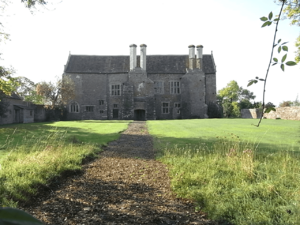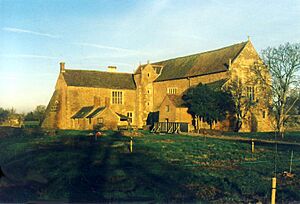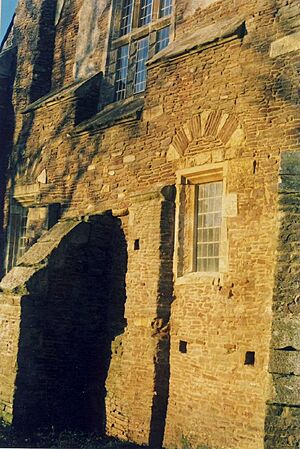Acton Court facts for kids
Quick facts for kids Acton Court |
|
|---|---|

Acton Court, south front
|
|
| Location | Gloucestershire, England |
| Lua error in Module:Location_map at line 420: attempt to index field 'wikibase' (a nil value). | |
Acton Court is a very old and important house in Gloucestershire, England. It's a special type of historic home called a manor house. This building is famous for its beautiful Tudor design. It has recently been brought back to life through careful restoration.
You can find Acton Court in Iron Acton, a village in South Gloucestershire. It's a bit of a distance from the main village and its church.
Contents
Acton Court: A Royal Tudor Home
What is Acton Court?
Acton Court is a grand old house that has stood for centuries. It's considered a "Grade I listed building," which means it's one of the most important historic buildings in England. The house shows us what homes looked like during the Tudor period, a long time ago.
A King's Visit
The Poyntz family owned Acton Court for over 300 years, starting in 1364. A man named Nicholas Poyntz (who passed away in 1557) made big changes to the house. He added a new part called the East Wing. This was built quickly, in about nine months, just before 1535.
Nicholas wanted to make a big impression on King Henry VIII. So, he decorated the new wing in a very fancy and modern style for the time. His plan worked! In 1535, King Henry VIII and his second wife, Anne Boleyn, actually stayed at Acton Court. They were on a trip around the West Country of England. Building work on the house continued until Nicholas Poyntz died in 1557.
From Grand Home to Farmhouse
The Poyntz family's direct ownership of Acton Court ended in 1680. After that, the house was sold. It was made smaller and changed into a farmhouse, where people lived and worked on the land. Over many years, the house was not looked after very well. By the end of the 1900s, mostly only the East Wing was left standing.
However, this neglect actually helped preserve something amazing! Because it wasn't changed much, the East Wing kept its original Tudor royal apartments almost perfectly intact. These are special rooms designed for a king or queen. It's very rare to find such rooms still in their original state.
Bringing History Back to Life
In 1984, a woman named Eva Dorothy Brown bought Acton Court at an auction. She bought it for a group called the Bristol Visual and Environmental Group (BVEG). This group wanted to save the historic house.
A huge project began to restore Acton Court. Before the restoration, a group called English Heritage did a detailed study of the house. This study helped them understand how the house had changed over time. The restoration work was finished not long ago, bringing this incredible piece of history back to life for everyone to see.
 | Frances Mary Albrier |
 | Whitney Young |
 | Muhammad Ali |



